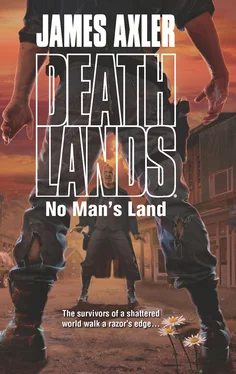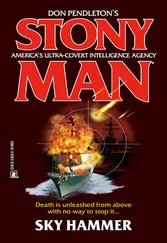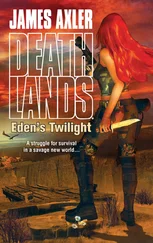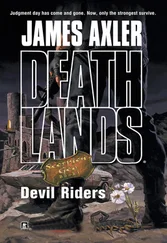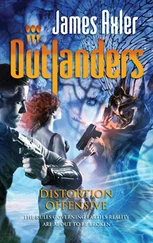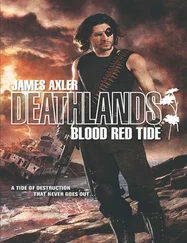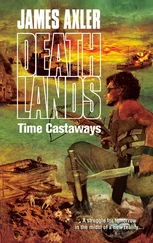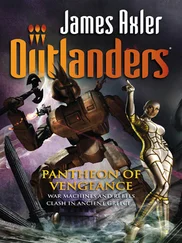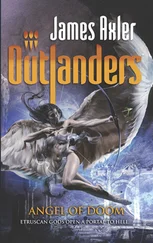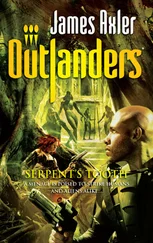“Sometimes it happens to us.”
They had jumped into a redoubt that afternoon from Puerto Rico, courtesy of the mysterious mat-trans network. They and only a few others knew of the device’s existence. Mildred had long since decided not to cling to those memories. They were nothing she cared to cherish. And there were so many of them...
The redoubt had been thoroughly gutted. Like some, it didn’t seem to have successfully weathered the storm that had blown away the world Mildred had known. What had left it with its door jammed open she couldn’t guess; the only nuke hot spot she knew of in the vicinity was near what had been Des Moines, miles in the northwest. There didn’t seem to have been a lot of other nukes going off in the immediate vicinity. The colossal earthquakes that accompanied the missiles’ fall might have done the trick.
Some animals had ventured inside. Small skeletons lay among scattered debris that had long since itself decayed to a sort of compost in the echoing, sterile concrete corridors. Soil and rock slipping from the hillside beneath which the redoubt was buried had covered the entrance long ago. They’d had a hard job working with knives and a folding Swiss-made entrenching tool J.B. carried strapped to his pack before digging their way out into what remained of the day’s light.
They’d been rewarded by the sounds of shots and shouts and screams coming their way, fast.
By running flat-out they’d made it to the shelter of a stand of saplings by a small stream that meandered through a valley amid low round hills. Fortunately the spring bloom had leafed out the brush that was clumped around and between the skinny trees enough to offer concealment for the companions.
The two men who were carrying on a running fight on horseback raced over a nearby ridge. From the thick green-gray smoke cloud that traveled along with the skirmish, the companions could tell they were firing black-powder blasters, something prevalent in parts of the Deathlands where stocks of predark ammunition were starting to run dry. About twenty other riders seemed to be trying to kill one another, as well.
The fighters had managed to do little apparent damage to one another before their running fight headed up the far slope of the little valley and away out of sight. Still they left a couple of men lying on the ground behind them. One lay stone-still. The other moved and moaned.
The key thing was, one was dressed all in green, and the other all in blue, as were some of the riders who’d made it past, if not intact, then fit enough to stay in the saddles of their sweat-lathered mounts. The rest, Mildred had seen as they splashed through the stream not forty yards away, all wore cloths of either blue or green tied around their upper arms.
When the last horse’s tail vanished over the green grassy rise, Ryan led his companions from their cover. They sprinted along the stream, at right angles, more or less, to the skirmishers’ axis of travel. It was neither the way the combatants had come from, nor where they were going.
None had spared so much as a thought to giving some kind of help to the wounded man. To her shame, even Mildred—a physician born in the twentieth century gave it no more than a flicker of a thought before joining the others in a run. Now was not the time; giving aid might jeopardize her friends.
She’d get used to it all. Someday. She hoped.
* * *
THE SUN WAS ALREADY sinking into blood and fire to the west when Ryan selected the campsite. They were as far away from where they’d encountered the cavalry battle as they could take themselves before they had to stop for the night. Whether it was far enough—only time and fate would tell.
Somewhere out in the night a fox barked to his mate. Mildred stiffened; it wasn’t a call Jak used with them—they favored bird calls for those undecipherable warnings and signals—but it didn’t mean some other party might not. And even if they weren’t in a war zone, “outlander” these days was just another word for danger.
But the others showed no sign of tension. So Mildred, with a sigh, let go of her own. Sometimes a fox was just a fox, she reassured herself. They’d probably be nursing cubs in their den now, she knew.
“How the hell can they even field a whole army, anyway?” she asked when conversation turned to the battle. “Much less two?”
“This is rich country,” Krysty said. “Lush and vibrant.”
“But most villes we’ve visited, even the better-off ones, can barely muster enough sec men for one of those patrols we avoided today,” Mildred said. “And something tells me that little set-to was just a sideshow to the main attraction.”
“The uniforms,” Doc said, “and their arms suggest both are part of far larger organizations.”
“Don’t get stuck thinking in terms of just one ville, either, Mildred,” J.B. said. He took off his wire-rimmed specs and polished them with a clean rag from his shirt pocket. “Could be there’s an alliance. Couple alliances, one against the other, by what we saw today.”
Ryan nodded. He had hunkered down now to gaze moodily into the dying fire.
“We had allies back in Front Royal,” he said. “Not so many as enemies, of course. But yeah, it happens.”
“We saw some pretty fair alliances in our travels with the Trader, didn’t we, Ryan?” J.B. said, putting his glasses back on. “One or two pretty brisk wars between them, too.”
He chuckled. “And being the sorts of natural trouble magnets we all were,” he said, “didn’t we go and get mixed up in a few of them ourselves?”
“Those were the days,” Ryan agreed with a grin.
“So why don’t we see alliances springing up among the real hardscrabble villes, places where it’s more than a full-time job scraping together the food and water to get by every day?” Mildred asked. “You’d think it’d be more natural for them to band together. Pool their resources, you know?”
“Barons like to keep a fist closed tightly on what they think of as theirs,” Krysty said. “The less they have, the harder they want to clutch, it seems like.”
“Everyone feels that way, always,” Doc said. “The idea that poverty ennobles is a foolish conceit, but a very ancient one, possibly as ancient as civilization itself. Want makes all of us hoard whatever small scraps we may have. Only in times of relative plenty—even if it is still a most mean existence—are we free to think in terms of cooperation and sharing. Barons are people, too, after all.”
“For a certain definition of ‘people,’” Mildred said.
“It’s not as if we haven’t seen starving mothers offering their babies for food,” Krysty said.
A sort of infinite sadness weighted her words. For all that she seemed actively callous to Mildred’s refined twentieth-century feelings sometimes, she in fact had the most nurturing nature of anyone Mildred had ever known; only nurses from back in her day came close. It was just that the standard of compassion a person could afford, and still keep their own body and soul together, had changed as harshly as the world.
“So the very lushness of this country may conduce to baronial cooperation,” Doc said.
“Got a point there, Doc,” J.B. said. “But there’s something more. Land this rich offers rich pickings. Like a newly dead buffalo cow draws wolves and coyotes and wild dogs, and rumor of a fresh redoubt being found draws scavengers of the two-legged kind. It’d bring the hungry and the hard.”
“I wonder what they’re fighting about?” Ricky Morales asked. Jak had replaced him on sentry duty after wolfing his own portion of roast prairie dog.
“What do people ever fight for, boy?” Doc asked. “Plunder, territory, power. And always, vanity. Vanitas, vanitas, omnia vanitas.”
Читать дальше
